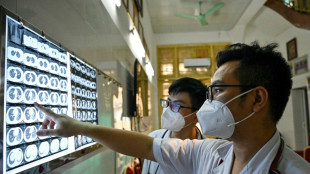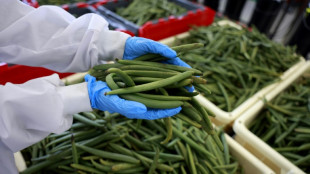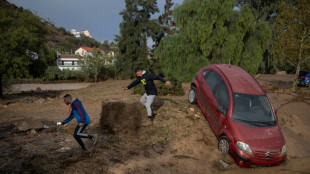
-
 UBS smashes forecasts with $1.4 bn net profit
UBS smashes forecasts with $1.4 bn net profit
-
Chinese EV giant BYD beats Tesla in quarterly revenue for first time

-
 US economic growth solid but below expectations as election nears
US economic growth solid but below expectations as election nears
-
Jurgen Klopp to target player welfare in Red Bull role

-
 Volkswagen sees 'painful' cost cuts ahead as profit plunges
Volkswagen sees 'painful' cost cuts ahead as profit plunges
-
Spain races to save victims as floods kill 62

-
 Tuberculosis cases hit record high: WHO
Tuberculosis cases hit record high: WHO
-
Bangladesh stumble to 38-4 in reply to mammoth South Africa total

-
 Volcanoes 'hidden source' of CO2 in past climate change: study
Volcanoes 'hidden source' of CO2 in past climate change: study
-
Stocks falter, bitcoin close to record high

-
 Eurozone economy grows faster than expected
Eurozone economy grows faster than expected
-
Mediators to propose Gaza truce amid deadly Israeli strikes

-
 China's Hisense first sponsor of new Club World Cup
China's Hisense first sponsor of new Club World Cup
-
Georgia prosecutors probe alleged election 'falsification'

-
 New Zealand's Ajaz 'emotional' on Mumbai return after perfect 10
New Zealand's Ajaz 'emotional' on Mumbai return after perfect 10
-
Germany dodges recession, posts surprise growth on spending boost

-
 Trump, Harris in frantic campaign push as US election nears
Trump, Harris in frantic campaign push as US election nears
-
De Zorzi out for 177 as S. Africa power to 527-6 against Bangladesh

-
 Worries for Japan economy after election shock
Worries for Japan economy after election shock
-
Israel short on soldiers after year of war

-
 Volkswagen profit plunges on high costs, Chinese slump
Volkswagen profit plunges on high costs, Chinese slump
-
De Zorzi out for 177 as S.Africa power to 413-5 against Bangladesh

-
 'CEO of supercute': Hello Kitty turns 50
'CEO of supercute': Hello Kitty turns 50
-
Australia head coach McDonald handed new deal until 2027

-
 Visual artist grabs 'decisive moment' to nurture Chad art scene
Visual artist grabs 'decisive moment' to nurture Chad art scene
-
Industrial slump leaves Germany on brink of recession

-
 'I'm terrified': French auteur Audiard hits Oscars trail for 'Emilia Perez'
'I'm terrified': French auteur Audiard hits Oscars trail for 'Emilia Perez'
-
New Indonesia defence chief harks back to dictator's rule

-
 In Tennessee, the despair of gun control advocates
In Tennessee, the despair of gun control advocates
-
US economy's solid growth unlikely to register at ballot box

-
 'A treasure': Japan's Ohtani a hometown hero win or lose in World Series
'A treasure': Japan's Ohtani a hometown hero win or lose in World Series
-
Botswana votes with ruling party seeking to extend six decades of power

-
 Bitcoin close to record as cautious markets eye US election
Bitcoin close to record as cautious markets eye US election
-
Hometown hero Volpe lives dream with grand slam for Yankees

-
 Rested relief pitchers please Roberts even after Dodgers defeat
Rested relief pitchers please Roberts even after Dodgers defeat
-
UK's Labour govt prepares to deliver decisive first budget

-
 Beijing files WTO complaint over EU's new taxes on Chinese EVs
Beijing files WTO complaint over EU's new taxes on Chinese EVs
-
Volpe's grand slam helps Yankees avoid World Series sweep

-
 Taiwan battens down for Super Typhoon Kong-rey
Taiwan battens down for Super Typhoon Kong-rey
-
MotoGP world title in sight as Martin, Bagnaia set for Sepang duel

-
 'New wave' as start-up sweeps up Thai ocean plastic
'New wave' as start-up sweeps up Thai ocean plastic
-
Botswana votes with ruling party aiming to extend six decades of power

-
 How harmful are microplastics to human health?
How harmful are microplastics to human health?
-
Are bioplastics really the wonder alternative to petro plastics?

-
 EU's extra tariffs of up to 35.3% on Chinese EVs angers Beijing
EU's extra tariffs of up to 35.3% on Chinese EVs angers Beijing
-
Rumble in the Jungle remembered after 50 years

-
 Trump risks backlash with anti-trans ads targeting Harris
Trump risks backlash with anti-trans ads targeting Harris
-
Alzheimer's patient 'relieved' at Quebec's assisted suicide policy shift

-
 Who should get paid for nature's sequenced genes?
Who should get paid for nature's sequenced genes?
-
Bodies found as torrential rains slam Spain

| RIO | 0.6% | 66.58 | $ | |
| CMSC | -0.65% | 24.57 | $ | |
| SCS | -3.11% | 12.21 | $ | |
| NGG | -1.35% | 65.12 | $ | |
| BCC | -5.3% | 131.64 | $ | |
| CMSD | -0.16% | 24.84 | $ | |
| JRI | -0.69% | 12.98 | $ | |
| RBGPF | 100% | 62.35 | $ | |
| BTI | -1.31% | 34.46 | $ | |
| BCE | -0.71% | 32.46 | $ | |
| GSK | 0.76% | 38.17 | $ | |
| AZN | -1.05% | 75.22 | $ | |
| RYCEF | 0.55% | 7.25 | $ | |
| RELX | -0.52% | 47.91 | $ | |
| BP | -5.76% | 29.36 | $ | |
| VOD | -2.8% | 9.28 | $ |

Volcanoes 'hidden source' of CO2 in past climate change: study
Massive fields of magma underneath ancient volcanoes spewed out carbon dioxide long after eruptions on the surface had ended, potentially explaining why past global warming episodes lasted longer than expected, a study said Wednesday.
Humans are emitting far more planet-heating carbon-dioxide (C02) than all the world's volcanoes put together. But scientists hope that by studying climate change in Earth's distant past, they can understand how the world heats up -- and crucially, how it can cool down again.
Scientists have long been puzzled by how long it took Earth's atmosphere to recover from a mass extinction event 252 million years ago that ended the Permian period.
It was the most severe extinction event in our planet's history, wiping out roughly 90 percent of marine species and 70 percent of those on land.
Scientists believe the upheaval was caused by huge volcanic eruptions in Siberia. The eruptions created what are called large igneous provinces -- huge underground regions of magma and rock -- which have been linked to four of the five big mass extinctions since complex life appeared on Earth.
It took Earth's climate nearly five million years to recover.
But according to scientific models, the world should have regrouped much more quickly.
"Earth's natural thermostat seems to have gone haywire during and after this event," said Benjamin Black, a researcher at Rutgers University in the United States and lead author of a new study in the journal Nature Geoscience.
- 'This gives me hope' -
To find out more, the US-led team carried out chemical analyses of lava, used computer models to simulate inner-Earth processes and compared climate records preserved in rock.
Their results suggested that even once volcanic activity had ended during past episodes, magma kept releasing carbon dioxide deep in the Earth's crust and mantle, which continued heating the globe.
"Our findings are important because they identify a hidden source of CO2 to the atmosphere during moments in Earth's past when climate has warmed abruptly and stayed warm much longer than we expected," Black said in a statement.
"We think we have figured out an important piece of the puzzle for how Earth's climate was disrupted, and perhaps just as importantly, how it recovered."
Black told AFP that the process described in the study "definitely cannot explain present-day climate change".
All the world's volcanoes currently "release less than one percent as much carbon to the atmosphere as human activities," he explained.
The type of volcanism the team investigated was last seen on Earth 16 million years ago, Black said, and was so enormous it could "cover the continental United States or Europe half a kilometre deep in lava".
But if the findings are confirmed, it could show that Earth's thermostat is working better than scientists had thought.
"This gives me hope that geologic processes will be able to gradually draw anthropogenic CO2 back out of the atmosphere," Black said.
"But it will still take hundreds of thousands to millions of years, which is obviously a long time for human beings."
B.Finley--AMWN